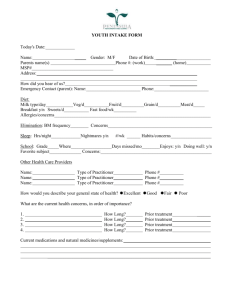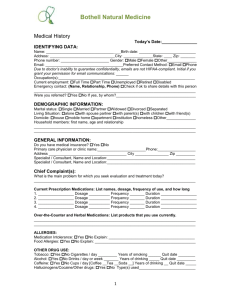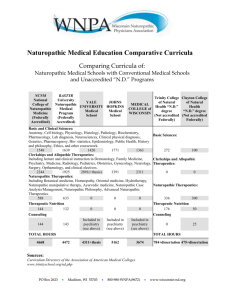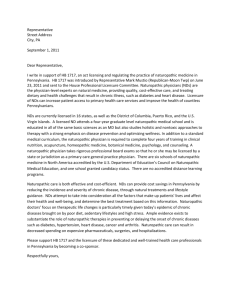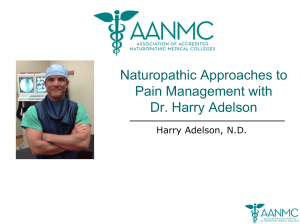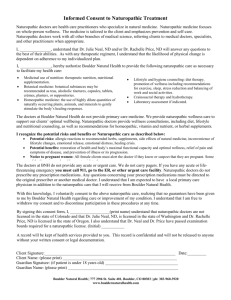Q&A - American Association of Naturopathic Physicians
advertisement
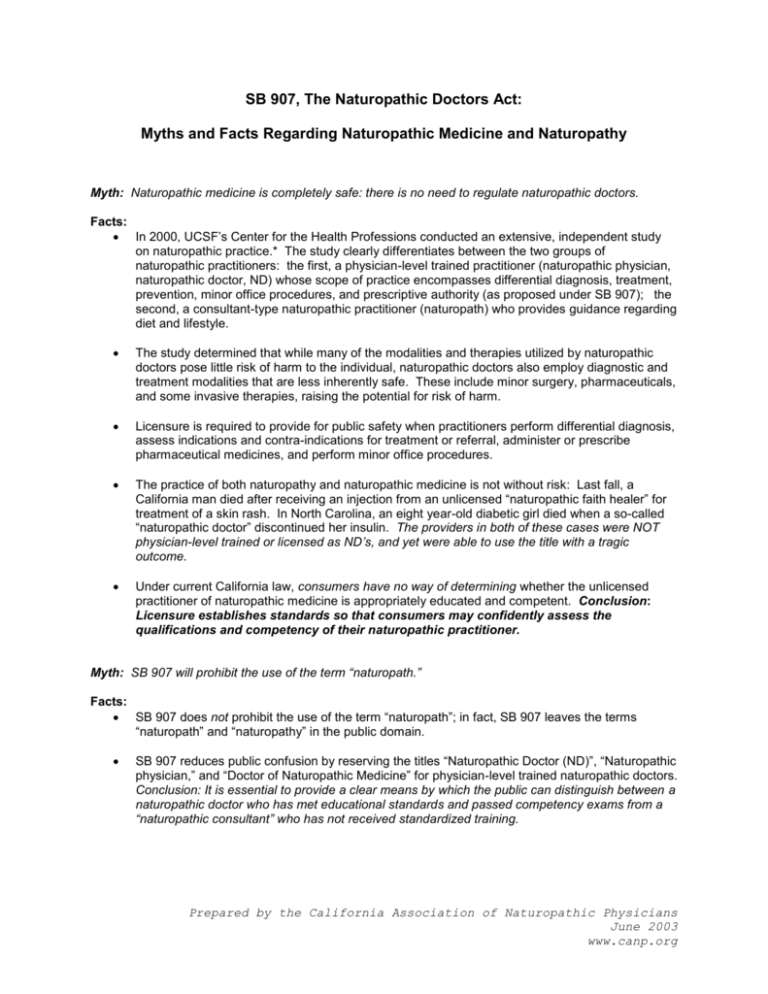
SB 907, The Naturopathic Doctors Act: Myths and Facts Regarding Naturopathic Medicine and Naturopathy Myth: Naturopathic medicine is completely safe: there is no need to regulate naturopathic doctors. Facts: In 2000, UCSF’s Center for the Health Professions conducted an extensive, independent study on naturopathic practice.* The study clearly differentiates between the two groups of naturopathic practitioners: the first, a physician-level trained practitioner (naturopathic physician, naturopathic doctor, ND) whose scope of practice encompasses differential diagnosis, treatment, prevention, minor office procedures, and prescriptive authority (as proposed under SB 907); the second, a consultant-type naturopathic practitioner (naturopath) who provides guidance regarding diet and lifestyle. The study determined that while many of the modalities and therapies utilized by naturopathic doctors pose little risk of harm to the individual, naturopathic doctors also employ diagnostic and treatment modalities that are less inherently safe. These include minor surgery, pharmaceuticals, and some invasive therapies, raising the potential for risk of harm. Licensure is required to provide for public safety when practitioners perform differential diagnosis, assess indications and contra-indications for treatment or referral, administer or prescribe pharmaceutical medicines, and perform minor office procedures. The practice of both naturopathy and naturopathic medicine is not without risk: Last fall, a California man died after receiving an injection from an unlicensed “naturopathic faith healer” for treatment of a skin rash. In North Carolina, an eight year-old diabetic girl died when a so-called “naturopathic doctor” discontinued her insulin. The providers in both of these cases were NOT physician-level trained or licensed as ND’s, and yet were able to use the title with a tragic outcome. Under current California law, consumers have no way of determining whether the unlicensed practitioner of naturopathic medicine is appropriately educated and competent. Conclusion: Licensure establishes standards so that consumers may confidently assess the qualifications and competency of their naturopathic practitioner. Myth: SB 907 will prohibit the use of the term “naturopath.” Facts: SB 907 does not prohibit the use of the term “naturopath”; in fact, SB 907 leaves the terms “naturopath” and “naturopathy” in the public domain. SB 907 reduces public confusion by reserving the titles “Naturopathic Doctor (ND)”, “Naturopathic physician,” and “Doctor of Naturopathic Medicine” for physician-level trained naturopathic doctors. Conclusion: It is essential to provide a clear means by which the public can distinguish between a naturopathic doctor who has met educational standards and passed competency exams from a “naturopathic consultant” who has not received standardized training. Prepared by the California Association of Naturopathic Physicians June 2003 www.canp.org Myth: SB 907 will prevent “naturopaths” from practicing in California. Facts: The practice of other naturopaths falls under the authority of last year’s “health freedom” bill, SB 577, and the Medical Practice Act. SB 907 does not impact, limit, or expand the practice of naturopaths; they may continue to practice as they currently do under SB577. SB 907 defines a non-exclusive scope of practice for naturopathic doctors; it does not prohibit any other health practitioner from practicing naturopathy or utilizing “naturopathic” modalities, including nutrition, herbs, homeopathy, light, air, and water. Myth: SB 907 discriminates against “equivalently-trained naturopaths.” Facts: Equivalently trained naturopathic doctors would be eligible to apply and be licensed; however, the training programs of naturopaths and naturopathic doctors are not equivalent. The UCSF study describes naturopaths as having “a much more varied set of pathways for entry into practice and training ranges from self-instruction and apprenticeship to more formal courses of study…this second title avoids the use of the word “doctor”, as this implies a more formal and systematic course of study, regardless of which tradition one works in.” Public health policy demands that a standard be established by which consumers can be assured that their healthcare provider is well trained, competent, and accountable for the care they provide. The educational standards for naturopathic doctors are already well established by regional accrediting bodies and accreditation through the Council on Naturopathic Medical Education (CNME). Their competency is measured by regular testing against these standards throughout their education, as well as national board exams in naturopathic medicine (the Naturopathic Physicians Licensing Examination--NPLEX). SB 907 defines a standard by which consumers may differentiate between practitioners who have attained institutionally-endorsed pathways of physician-level training (ND), and those who have followed vocational and non-traditional courses of study (naturopaths). Determining equivalency of non-traditional pathways of learning is beyond the scope of SB 907. Advanced standing is available at CNME-approved naturopathic medical schools for applicants who demonstrate sufficiently equivalent training. Myth: SB 907 will negatively impact current naturopathic training programs in California. Facts: There is currently no naturopathic training program in California whose curriculum is equivalent to the physician-level training in naturopathic medicine available in states that license NDs. Without licensure, clinical training cannot be offered to students of naturopathic medicine in California. SB 907 will allow the establishment of a physician-level training program in naturopathic medicine in California, offering greater opportunity for study, additional educational pathways for California’s naturopathic practitioners and the opportunity for collaboration with conventional medical institutions. Vocational naturopathic training programs would only be impacted if they were granting a doctorate in naturopathic medicine without meeting the standard of education accepted as necessary to practice medicine. Graduates of vocational naturopathic programs in California will continue to be able to practice to the extent of their training within the limits of SB 577 and the Prepared by the California Association of Naturopathic Physicians June 2003 www.canp.org Medical Practice Act (that already specifies that they cannot represent themselves as doctor or physician). Myth: SB 907 departs from “traditional naturopathy.” Facts: Again, the UCSF study clearly differentiates that there are two naturopathic practice groups: first, the physician-level trained practitioner (naturopathic physicians) whose scope of practice encompasses differential diagnosis, treatment, prevention, minor office procedures, and prescriptive authority; second, the consultant-type naturopathic practitioner who gives guidance regarding diet and lifestyle. Each of these groups share similar philosophical roots, promotes naturopathic principles, and offers consumers uniquely different services. Licensure of NDs will provide consumers access to the full spectrum of naturopathic practitioners. Myth: CNME-educated ND’s are not willing to accept reasonable standards for education and examination. Facts: Accreditation: Approved naturopathic medical schools are accredited by the same federally recognized, “regional accrediting bodies” that recognize the major state and private universities in the areas where they are located. There is no higher level of accreditation standard. Examination: NPLEX (the Naturopathic Physicians Licensing Examination) is a psychometrically sound national board exam administered by the North American Board of Naturopathic Examiners. This exam has been accepted as the gold standard of demonstrating competency in naturopathic medicine by all states that license naturopathic doctors. Myth: SB 907 is not necessary because the “health freedom” legislation passed in California last year (SB 577) already allows naturopathic doctors (NDs) to legally practice. Facts: SB 577 does NOT allow naturopathic doctors to practice as trained. Without licensure of ND’s, consumers are denied access to physician-level practitioners of naturopathic medicine, whose training goes well beyond the limited diagnostic and treatment activities authorized by SB 577 (Sect 3643.5b). Naturopathic doctors are graduates of four-year, doctoral-level programs of naturopathic medicine that include differential diagnosis and clinical training, minor surgery, and pharmacology. Diagnosis and treatment at these higher levels of practice require same regulatory standards as MD’s, DO’s, DC’s, and LAc’s. A California Appellate Court Decision, Oosterveen Vs. Medical Board of Examiners (1952), declared that naturopathy is the practice of medicine and that, while practitioners licensed in the healing arts in California may use naturopathic modalities, only those licensed as naturopathic doctors may practice naturopathic medicine. * UCSF Center for the Health Professions’ Profile of a Profession: Naturopathic Practice. pp. 3, 16 (www.futurehealth.ucsf.edu) Prepared by the California Association of Naturopathic Physicians June 2003 www.canp.org
